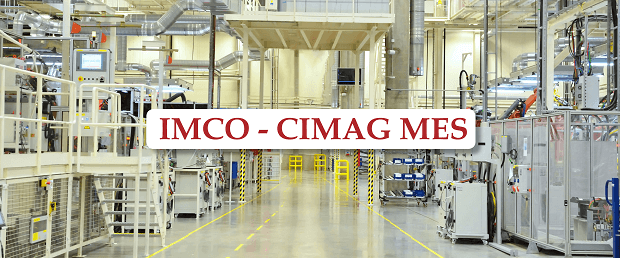Below is our recent interview with Ruben Mirensky, President & CEO of IMCO Software:

Q: Ruben, let’s start with your background. What were you doing before IMCO Software?
A: My education background is in finance and management of information systems. My work experience, however, is predominantly in operations. I was Global Director of Supply Chain for the Chemical Division of ThermoFisher and the Global Director for Arizona Chemical (which was the chemical arm of International Paper). I, together with our consultants, work on improving operations at second tier companies around the world.
Q: Do you consider IMCO an IT solutions provider or an Operational Excellence consulting services provider?
A: IMCO is an operational excellence consulting services provider. We use technology to achieve the operational excellence goals of our clients and to make those achievements and solutions sustainable in the long run. Some of the technology solutions we use include IMCO – CIMAG MES (our Manufacturing Execution System), ERP system implementations, IMCO IMS (our Inventory Management System), IMCO EMS (our Energy Management System) and IMCO CL (our Computer Learning functionality).
 Recommended: Growjo Launches Fastest Growing Washington DC Companies Award For 2019
Recommended: Growjo Launches Fastest Growing Washington DC Companies Award For 2019
Q: Can you provide an example of how that technology helps achieve Operational Excellence goals and makes them sustainable?
A: Absolutely.
We originally developed our IMS in Excel as a tool to segregate inventory, and to be able to set inventory targets and inventory policies for different item groups. We had a dual purpose:
• Being able to reduce working capital tied up in inventory without reducing customer service – maybe even improving it.
• Accentuate the most critical factors in order to improve on in the inventory policy for different item groups:
o Reliability of supply.
o Shorter supply lead times.
o Longer customer lead times.
We provided, and still provide, the straw model of IMS free as part of our consulting engagements. As a matter of fact, we always first implemented the Excel version in order to determine the various parameters pertinent to every client.
The Excel version, however, is not sustainable for a variety of reasons. Clients eventually, once they appreciate the benefits of IMCO IMS, turn to the more robust, programmatic version. The programmatic version allows changes to parameters such as frequency of delivery and desired service levels for the different groups, as well as the way items should be segregated. It also allows for the customization of the scope of the analysis: global, regional, national, or site specific, with a couple of clicks.
Q: What would you say differentiates IMCO – CIMAG from other MES products on the market?
A: As with most every software package, it is hard for one shoe to fit all. Different products have different functionalities, which are usually developed at the request of the industries they serve, that make them the most appropriate package for certain industries and/or certain size companies.
The main strengths of IMCO – CIMAG MES are:
• Flexibility. We integrate with a long list of other systems and legacy systems, that is what IMCO specializes in.
• State of the art scheduling tool. If production scheduling is an important consideration for your company, ours has functions and details that most others don’t have.
• The way we connect operations. Some companies have peculiar needs in the way shop order operations connect one to another. IMCO – CIMAG covers practically every possible way I can think of or have seen in more than 40 years in the manufacturing space.
• Dynamic routing. Some companies need to schedule based on a production wheel. Changing the order in which products are made can dramatically affect the assembly and disassembly time. IMCO – CIMAG is one of the few products I know that offers scheduling based on the order products are made as part of the logic used.
Q: How do IMCO products interlace with each other?
A: Our core product is IMCO – CIMAG MES, our Manufacturing Execution System. The other products, even though they might originally have been developed as stand-alone products with a goal of their own, have been modified to easily be integrated with IMCO – CIMAG MES. For example:
• IMCO IMS (our Inventory Management System) optimizes inventory levels per item/location combination and IMCO – CIMAG uses that data as the target inventory in Planning and Scheduling production.
• IMCO EMS (our Energy Management System) in combination with IMCO – CIMAG provides a much more exact way of allocating energy cost to products by location, shift, machine, tool, and personnel. In addition, it allows for an infinite number of what if scenarios meant to optimize energy and water cost and reduce CO2 emissions.
• IMCO CL (our Computer Learning functionality) generates planned maintenance orders based on a multitude of conditions in a much more accurate way than humans can or the manufacturer’s suggested schedule. Those planned maintenance orders become part of the schedule, together with the production orders, allowing the user to schedule them at a time when they are least disruptive to manufacturing operations.
 Recommended: Technology Platform Claro Applies Machine Learning To Develop Unique Workforce Insights
Recommended: Technology Platform Claro Applies Machine Learning To Develop Unique Workforce Insights
Q: Can IMCO handle international implementations?
A: We have, for years, handled projects that encompass multiple sites in multiple countries and multiple continents. We have offices in some key locations around the world, where we don’t, we have partners that do and can provide support: in Latin-America (Argentina, Colombia and Mexico), the US and Canada, in both Eastern and Western Europe, Israel, India, and China. Including our partners, the number of employees is more than 700 people (about 100 our own employees and 600 our partners’). 550 of those employees are consultants with expertise in various functional areas in Manufacturing and Supply Chains. More than half of our consultants, roughly 350 people, are engaged in providing different levels of help desk support and roughly 200 people are engaged in new implementations. We rotate consultants from projects to help desk support. We require all our consultants to complete at least 15% of their time training in new skills.
Q: What are your plans for the future?
A: Develop partnerships with other software companies and consulting companies that provide services in the manufacturing and supply chain space. Some possible targets are software companies that provide long term planning, i.e. JDA, or quoting systems, i.e. Paperless Works.

